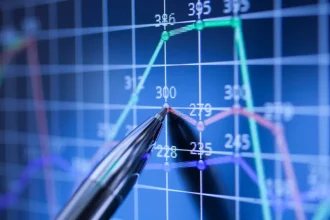Climate change, single-use plastic and leadership diversity are so 2019. Mark Dunne looks at what could replace them in the ESG headlines in the year ahead.
Predicting the future is not easy, even for experts. At the end of 2018, I spoke to asset managers and consultants to build a picture of what environmental, social and governance (ESG) themes institutional investors could be factoring into their investment decisions in the year ahead. Harmful gas emissions, leadership diversity and concerns over plastic bottles floating in the sea were predictions our ESG experts called right. Yet one subject missing from their prophecies was that 2019 saw the arrival of the vegan sausage roll.
It landed on the UK’s high streets in branches of Greggs on the second day of 2019 and no one I spoke to saw it coming. The introduction of a meat and dairy-free sausage roll proves how difficult accurately predicting even the immediate future can be. Undeterred by this conclusion, I have once again spoken to those working with asset owners to find out what sustainability issues could be on decision-makers’ checklists in 2020.
A NEW CONVERSATION
It appears that 2020 may not be a radical departure from 2019 in the sustainability space. Fawzy Salarbux, global head of consultant relations at Candriam, describes the coming year as a “well-trodden path” focusing on climate change and plastic. “There are a lot of themes that will run on,” he adds. “[Climate change] is a trend that is well in motion.”
Emily Chew, global head of ESG at Manulife Investment Management, is not surprised that a continuation of what we saw in 2019 is expected. “These things do not get fully explored, understood and resolved in one year,” she says. “There will be a continuing crescendo around plastic, gender equality, executive pay and diversity and inclusion.”
Although climate change is a long-term trend the conversation around the issue will be different this year, Chew believes. “It is going to be more about the business of implementing the Paris Agreement rather than the aspirational statements that we have seen,” Chew says. “Asset owners will be looking to drive that conversation more actively than they have over the past few years.”
This means that a focus on aligning science-based targets with the Paris Agreement will come to the fore. “There will be an increasing awareness of what the science means and more attempts to bring that into investment decision making, both through valuation modelling and company engagement,” she adds.
The issue is that targets set by the Paris Agreement and endorsed by governments include being carbon neutral by 2050, but how can that be achieved? “A lot of the low hanging fruit, especially in Europe’s corporate sector, has already been picked,” Chew says. “We are talking about transformational moments here and the investment community is trying to keep up.”
Another trend in the evolving climate change discussion in 2020 will be temperature allocation in portfolios, says Mark Lewis, BNP Paribas Asset Management’s head of climate change investment research. “Everywhere I go people ask me how they can calculate the temperate implied by their portfolio.
“That is not going to be easy to figure out, it is going to create a lot of work in the asset management and consultancy industries, but this is where the industry is heading and regulators are going to start looking at this. It is going to be a big, big topic in 2020,” he adds.
SUPPLY CHAINS
So climate change and fossil fuel companies are expected to remain in the spotlight this year, but people will increasing be looking at the harmful gas emissions generated in supply chains.
Fashion and textiles is one industry in the firing line, according to Lewis. “They have a horrendous environmental footprint with the shocking levels of water they use,” he says. “The textile industry is responsible for 20% of all industrial water pollution. That is just one horror stat that I could give you. It is a completely unsustainable industry in its current form.”
For a long time, data has been the Achilles Heel of ESG and there is still a long way to go.
Fawzy Salarbux, Candriam
The food industry is also being judged negatively. The deforestation associated with the industry and its use of anti-biotics in livestock make it another unsustainable part of the supply chain. “The whole question of supply chains is going to be a big topic,” Lewis says. “You cannot expect the fossil fuel industries to keep getting all of the attention,” he adds. “At some point other industries, which have essentially been having a free ride on this, are going to come under the microscope.”
KNOWLEDGE IS POWER
In the sustainable investment space, data and disclosure could be another big theme in 2020, believes John Belgrove, a senior partner at Aon.
“This is where the battle ground lies,” he says, pointing to trustees needing quality, consistent and comparable data to understand their exposures and the direction of travel. “It is an important area,” Belgrove adds. “Like anything in investment, you want data to support your decisions.”
There are independent companies providing ESG data, but there has been criticism of the consistency and interpretation of the information produced. “There is a journey going on around the improvement of data quality,” Belgrove says.
The need for better quality data is not only being driven by investors wanting to measure the non-financial performance of their portfolio. Regulation has cranked up the pressure on trustees to disclose if they are meeting the TCFD’s recommendations. “What is the state of readiness for TCFD disclosure among pension schemes? Very little. That is why the battle ground is on the data,” Belgrove says.
Generating accurate data could be easier in the coming years with corporate disclosures expected to become more common. ESG is a broader set of initiatives than simply climate change and so metrics such as water conservation, soil erosion, plastics and gender equality could feature in corporate reports as standard one day.
“For a long time, data has been the Achilles Heel of ESG and there is still a long way to go,” Salarbux says.
2020 may not only be the year where the quality of sustainable data comes under increased scrutiny, it could also see a breakthrough in the way data is used, says David Czupryna, head of ESG client portfolio management at Candriam. “ESG has so far been predominately backwards looking,” he adds. “We use historical data, company analysis based on past behaviour, past controversies.”
The point is how can data be used not only to measure non-financial performance, but also to anticipate future trends that could become material.
Sugar is an example. It ruins peoples’ health but is not material. “Coca-Cola’s share price does not drop because of that,” Czupryna says. “On the other hand, plastic has become material in that regulators are banning single-use plastic, such as straws. With more regulation coming in on packaging, plastic is a material factor and will start impacting some sectors.
“That is an area that with the quantity of research we are seeing, we expect to see some development in 2020,” he adds.
MAKING AN IMPACT
Whilst there remains a stronger focus on carbon mitigation, Aon’s Belgrove believes that we could see an increasing interest around impact investing with the social pillar of ESG coming more into focus this year.
A shift is happening with companies having to demonstrate that they are acting in the best interests of not just their shareholders, but their stakeholders, too. The ethos is changing with directors not only having to drive value, but also understand the impact that they are having on local communities and the health and wellbeing of their staff.
Salarbux describes impact investment as one of the fastest growing asset classes after real assets. “I can see from large institutional clients that impact investing is going to be something that will be looked at quite intensely this year,” he adds. Only being a decade away from having to meet the sustainable development goals is another catalyst for driving interest in social projects, such as employee wellbeing and providing quality education.
The whole question of supply chains is going to be a big topic
Mark Lewis, BNP Paribas Asset Management
The E and the G in ESG are widely understood and covered, but the S component, which focuses on human capital, human rights and their respective impact on local communities, is becoming increasingly important, says Andrew Parry, head of sustainable investing at Newton Investment Management. “The S is a more challenging, but more interesting pillar. ”
When you think about it, all companies are social enterprises. Newton’s parent company BNY Mellon employs 65,000 people. That is the same size as my hometown in South Wales. “If you agree with the assertion that companies should be regarded as social enterprises, then ignoring the human capital, social impact and human rights issues is not a good idea,” he adds. “It is an area where we will see increased focus among pension schemes.”
GOVERNANCE UPGRADE
Following the governance scandals at large tech companies in recent years, Chew believes that there will be more scrutiny around how private equity firms are building up their portfolio companies with governance structures that minimise accountability to broader stakeholders.
What is inherent in the private equity business model that seems to be promoting companies to astronomical valuations and dumping unprofitable businesses on the public markets while company founders are not accountable to shareholders because of the governance structures that have been put in place.
Big tech is becoming to governance what oil and gas is to climate change. There have been issues around data security, alleged interference in national elections and loss-making companies paying ex-directors millions of dollars.
With an election in the US later this year, pledges to clean up the industry are likely to be made.
“There will be a bigger conversation on the role of tech companies and their net value generation for the economy and society, once you take into account the negative externalities,” Chew says.
HERE TO STAY
The people I have spoken with talk to trustees and their investment managers regularly, so are well placed to spot emerging trends. ESG will continue to be a topic discussed by commentators and investors alike as “we are still in the early phase of mainstreaming ESG in the financial industry,” Lewis says. “It is not a passing fad,” he adds. Just be prepared for 2020’s unexpected vegan sausage roll moment.
“There is always going to be curve ball,” Chew says. “That could be triggered by a controversy or a major weather event that shifts the needle in a direction that is not expected.
“The new normal in the investing space is to expect the unexpected,” she adds.





